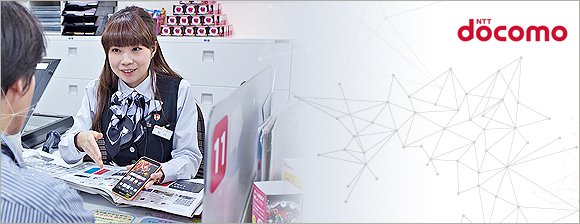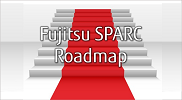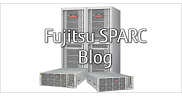Archived content
NOTE: this is an archived page and the content is likely to be out of date.
NTT DOCOMO, the largest mobile service operator in Japan, adopted high-performance Fujitsu M10 SPARC servers.
"Fujitsu M10 servers enable both performance improvement and cost reduction of our customer information management system as well as faster service provisioning with the ability to flexibly add resources."
Mr. Yoshinori Saiga, Director of Information Systems Department group, NTT DOCOMO, INC.
[Video] Customer Interview
The customer
NTT DOCOMO, based in Tokyo, Japan, has been in the telecommunications business for 24 years. As the largest mobile service operator in Japan with more than 66 million customers, NTT DOCOMO delivers innovative products, services and technologies in Japan as well as increasingly in overseas markets. For NTT DOCOMO, the role of Information and Communication Technologies (ICT) has become increasingly critical for supporting business. ICT operations and functions at NTT DOCOMO are built with the concept of “real time management”. Being able to promptly provide a complete view of product status and operation flow helps the company to focus on business management optimization.
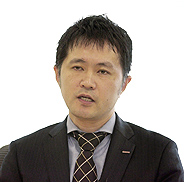
Mr. Yoshinori Saiga
Director of Information Systems Department group
NTT DOCOMO, INC.
In addition to real time management, NTT DOCOMO places significant importance on the fast provisioning of services. Mr. Yoshinori Saiga, Director of Information Systems Department group, NTT DOCOMO, INC., remarks, "Being able to provide services that meet customer needs in a timely manner and ahead of competitors is a crucial advantage in the market. When a competitor introduces new services, we may have to address it as fast as possible. The ability of our systems to respond quickly to a variety of requests is the most important factor."
With the spread of smartphones, the introduction of Mobile Number Portability service, and the entry of Mobile Virtual Network Operators to the telecommunications market, the Japanese mobile phone industry has been evolving rapidly. Service providers are locked in a fierce competition to improve profitability by continuously introducing new products, services and price plans and boost customer satisfaction.
The challenge
One of the business systems at the heart of NTT DOCOMO is the "ALADIN" (ALl Around DoCoMo INformation systems) customer information management system. ALADIN is one of the largest customer information management systems in the world, capable of supporting the entire subscriber base of NTT DOCOMO, growing to more than 66 million customers. ALADIN handles all customer-related operations, from new customer registration and credit checks to the management of price plans, contract periods, sales of new phones, and inventory control. ALADIN is a system of massive scale, linking NTT DOCOMO stores and call centers nationwide to data centers around Japan across approximately 5,000 total locations. Mr. Saiga emphasizes, "The ALADIN system handles all the operations related to customer support and has the critical challenge of not interrupting day-to-day business operations."
The ALADIN system processes over 27 million transactions per day, and the volume of transactions are increasing every year with the introduction of new services, phones and devices. Looking at the near future business growth projections, NTT DOCOMO recognized a need to upgrade their existing database server infrastructure to avoid a shortage of processing capacity.

Mr. Tadaaki Yoshida
Manager of Information Systems Department group
NTT DOCOMO, INC.
Mr. Tadaaki Yoshida, Manager of Information Systems Department group, NTT DOCOMO, INC., explains: "The lack of processing capacity can interrupt the provisioning of services when a sharp increase in transactions occurs, such as immediately after the introduction of new services or price plans. By all means we must prevent delays in introducing new services. For this reason, we needed a platform with the capacity to handle our future growth in transaction volume and the flexibility to add new resources as needed". At the same time, the new server platform had to provide both increased capacity and lower IT costs.
"At NTT DOCOMO, we are required to always make efficient ICT investments. If we were to use ordinary database servers, the costs required for deploying a system with full scalability in anticipation of the next several years of growth could be exorbitant. Achieving the target scalability, while reducing costs, was a major challenge." (Mr. Yoshida)
High reliability is also essential. The ALADIN system works together with other systems at NTT DOCOMO to support real time management, and there is significant impact to the business in the event of a system failure. High quality and highly reliable servers that enable stable and continuous system operation were therefore needed.
The solution
NTT DOCOMO compared various database server system options and selected the Fujitsu M10 SPARC server for its dramatically improved large-scale database performance and the unique CPU core activation feature, which allows system administrators to add processing resources one core at a time. Mr. Kenichi Suzuki, Information Systems Department group, NTT DOCOMO, INC., says, "CPU resources can be added in an incremental manner as the number of transactions increase. Because there is no need to overprovision the resources right from the beginning, the initial costs at the time of deployment and the subsequent maintenance costs can be minimized. This is exactly what we wanted."
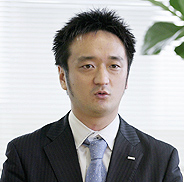
Mr. Kenichi Suzuki
Information Systems Department group
NTT DOCOMO, INC.
The Fujitsu M10-4S Building Block architecture, which enables the interconnection of up to 16 chassis as a single server, was also evaluated. Mr. Saiga commented, "Honestly, in the mobile phone industry, we cannot always predict the system requirements that will arise in the future. Information Technology (IT) departments, including ours, must be able to flexibly handle such situations. The Fujitsu M10 Building Block architecture allows us to grow capacity by adding one chassis at a time, thereby providing the ability to deal with sudden changes in demand with confidence."
The benefit
One of the reasons the Fujitsu M10 SPARC servers were selected was the inheritance of key performance and reliability technologies from Fujitsu supercomputer and mainframe platforms. Fujitsu servers have a great reputation for low failure rates and include reliability features such as data protection and redundancy to assure 24 hours by 365 day system uptime. Fujitsu also is known for a world-class support infrastructure that employs a very knowledgeable engineering team.
"We were familiar with the stability of SPARC servers from our past experience. This time, we selected the Fujitsu M10 server, which is particularly reliable." (Mr. Saiga)
"The ability to automatically assign transactions to a backup core in the event of a CPU failure is quite dependable. In addition, other vendors sometimes take time to investigate and report back on the cause of a failure, but Fujitsu responds quickly and has earned our confidence." (Mr. Suzuki)
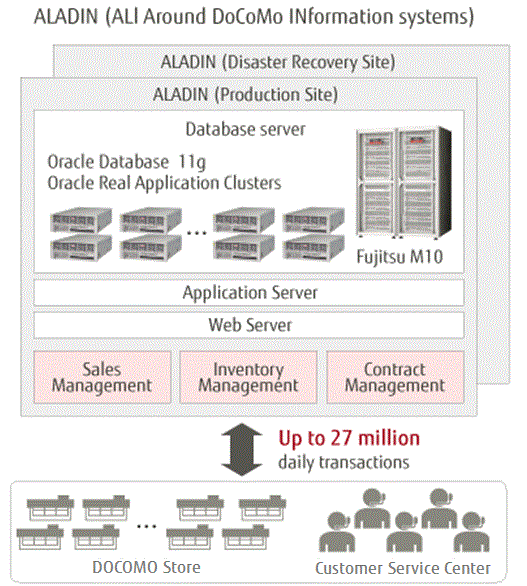
Conclusion
The NTT DOCOMO ALADIN project required large-scale server replacement, involving the deployment of Fujitsu M10-1, Fujitsu M10-4, and Fujitsu M10-4S servers; 50 servers in all. The replacement was completed in September 2014. Mr. Yoshida talks about the specific effects of deploying the Fujitsu M10 servers, "As for performance, the throughput of a CPU core increased by approximately 3.7 times, and the target processing capacity can now be achieved with a smaller number of cores. Because cores can be added to match the current service volume, we are able to achieve a significant reduction in software licensing fees, which are charged according to the number of cores used, as well as an approximately 75% reduction in server maintenance fees." In addition, the required rack space has been reduced by more than two thirds and the power consumption by approximately 50%.
Mr. Saiga proudly said, "Because CPU cores can be added very quickly, the system can immediately respond to the addition of new services and price plans, campaigns being launched, and requests from the business and management."
Mr. Yoshida remarks, "We are considering further server consolidation in the future by accelerating our Oracle Database instances with the advanced Fujitsu M10 Software on Chip (SWoC) features to achieve further cost efficiency and service quality."
Looking to the future Mr. Saiga states, "The deployment of Fujitsu M10 servers enabled performance improvement and cost reduction for the ALADIN system as well as faster service provisioning with the ability to flexibly add resources. We plan to further utilize Fujitsu M10 servers for other functions and for businesses in new fields in the future. Fujitsu has been working with us for over 20 years as a provider of system integration services and servers. We are expecting Fujitsu to continue to offer us proposals based on its deep understanding of our business and systems."
Download
Read the full NTT DOCOMO case study (184 KB/A4, 2 pages)
